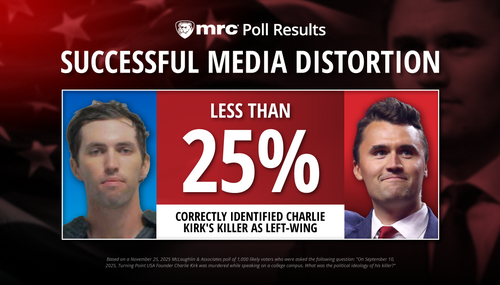 MSNBC’s Katy Tur is notably not a fan of President Trump and during Monday’s MTP Daily, where she was filling-in for Chuck Todd, she took numerous swipes at the commander-in-chief. “There are so many questions about what exactly Donald Trump’s foreign policy is. What does the Trump doctrine look like? … There's a lot of confusion about it,” she told Richard Haass of the Council on Foreign Relations, “And the flip-flops that we're seeing, are they rooted in pragmatism or are they rooted in ignorance?”
MSNBC’s Katy Tur is notably not a fan of President Trump and during Monday’s MTP Daily, where she was filling-in for Chuck Todd, she took numerous swipes at the commander-in-chief. “There are so many questions about what exactly Donald Trump’s foreign policy is. What does the Trump doctrine look like? … There's a lot of confusion about it,” she told Richard Haass of the Council on Foreign Relations, “And the flip-flops that we're seeing, are they rooted in pragmatism or are they rooted in ignorance?”
Haass seemed to be taken aback by Tur’s personal smear of the President as he tried to explain to her why it wasn’t necessary. “One, I think is, it’s way premature to for anyone to talk about a Trump doctrine,” he explained, noting that Trump hadn’t even been president for 100 days, “And doctrines are usually conferred from the outside on policies that are big and lasting. It is simply premature to be thinking about that.”
He admitted that Trump’s foreign policy and statements have been inconsistent, but recalled that Trump had talked about wanting to keep other countries ‘off balance.’ He also argued that such an attitude in the North Korea situation may be helpful since the U.S. policy over the last few presidencies has led to this “crisis,” according to Haass. “And I would argue that even if Hillary Clinton were the president, the United States would be signaling that what North Korea is about to achieve would be intolerable,” he added.
The MSNBC host conceded that all presidents have a learning curve when coming into office, but she continued to harp on her smear that Trump was “ignorant.” “Specifically, when I ask about ignorance, I'm referring to something that Donald Trump said about his meetings of President Xi of China,” she badgered her guest. Her gripe was with the fact that Xi had explained to Trump China’s history with North Korea and how their relationship works.
“When you hear about that—when you hear about Donald Trump saying, ‘I listened for ten minutes and then I changed my mind. I realized there was more going on.’ What does that say to you,” she complained and asked Haass. He responded by cutting Trump some slack in saying “I think it is important the President get a feel for [China’s perspective].” He also reminded Tur that “you know and I know there is a fundamental difference between campaigning as an outsider and governing as an insider.” He also claimed that Trump is currently in that transition.
Tur appeared to grow visibly frustrated with Haass’ leniency with the Trump administrations as she snapped back:
Absolutely, I don't argue with you on that. But he had to have the Chinese leader explain this to him. Does he have his own advisers that can explain this to him from an American perspective instead of getting the Chinese perspective on it?
Haass let her down hard. “And it’s one thing to have an American say, ‘This is how Chinese people think about this.’ I expect it is quite another when the Chinese president essentially paints a picture in his own words in his own term,” he explained, “It has a certain power and a certain authority that no CIA briefer could possibly convey.”
The attempt by Tur to have a serious foreign policy expert label Trump’s “doctrine” as one formed out of “ignorance,” came off as obviously biased and desperate. This is the same journalist who, just a few weeks ago, declared she wasn’t a “critic” of Trump. Where was his "ignorance" question when Obama flip-flopped on the Syria "red line," or his "flexibility" with Russia that Tur doesn't recall? That's not to mention Hillary Clinton's infamous "Russian reset."
Transcript below:
MSNBC
MTP Daily
April 17, 2017
5:11:58 PM EasternKATY TUR: Richard, there are so many questions about what exactly Donald Trump’s foreign policy is. What does the Trump doctrine look like? Is it internationalism? Is it nationalism? There's a lot of confusion about it. So my question to you is, what anchors him? And the flip-flops that we're seeing, are they rooted in pragmatism or are they rooted in ignorance?
RICHARD HAASS: Well, a couple of answers Katy. One, I think is, it’s way premature to for anyone to talk about a Trump doctrine. He hasn't been in office 100 days. And doctrines are usually conferred from the outside on policies that are big and lasting. It is simply premature to be thinking about that. You're right. We've seen inconsistencies, I think, to some extent he is finding his sea legs in the job. And I do think has this idea of trying to keeping others off balance. He does believe in unpredictability, which can be a blessing or a curse. And he’s basically a disruptor at heart.
Rather than wanting to continue, he wants to introduce a lot of new factors. Here with North Korea, that's not so bad. This has been drifting for 25 years. The drift has brought us to a crisis point. And I would argue that even if Hillary Clinton were the president, the United States would be signaling that what North Korea is about to achieve would be intolerable.
TUR: Richard there is always a learning curve no matter the president. They’re always going to change their opinions, their policies somewhat when they get into the oval office and see the realities of what we are facing in the world. Specifically, when I ask about ignorance, I'm referring to something that Donald Trump said about his meetings of President Xi of China.
He told The Wall Street Journal that “after listening for ten minutes, I realized it is not so easy.” Talking specifically about the Chinese relationship with North Korea. And the history there and why it is not so easy to necessarily for the China—for China to control North Korea. When you hear about that—when you hear about Donald Trump saying, “I listened for ten minutes and then I changed my mind. I realized there was more going on.” What does that say to you?
HAASS: Well, I'm actually glad this is happening. It’s a learning curve, it comes from listening. The Chinese already fought in the first Korean War. They have an important interest in North Korea. Different than ours, but to some extent overlapping. And I think it is important the President get a feel for this. Katy, you know and I know there is a fundamental difference between campaigning as an outsider and governing as an insider. And what we're seeing the transition from the former to the latter. This is essential and we are seeing it take place before our eyes.
TUR: Absolutely, I don't argue with you on that. But he had to have the Chinese leader explain this to him. Does he have his own advisers that can explain this to him from an American perspective instead of getting the Chinese perspective on it?
HAASS: Well sure, and I expect he got some of that. But there is something particularly powerful about a Chinese leader talking about the Korean War from the Chinese perspective … And to basically say here's what counts from our perspective. And it’s one thing to have an American say, “this is how Chinese people think about this.” I expect it is quite another when the Chinese president essentially paints a picture in his own words in his own term. It has a certain power and a certain authority that no CIA briefer could possibly convey.




